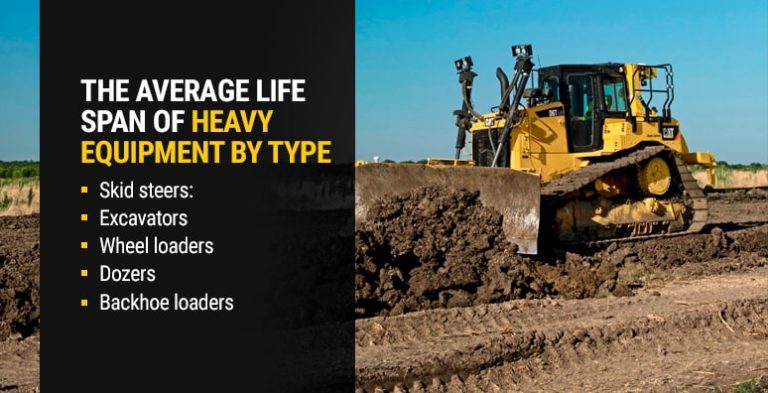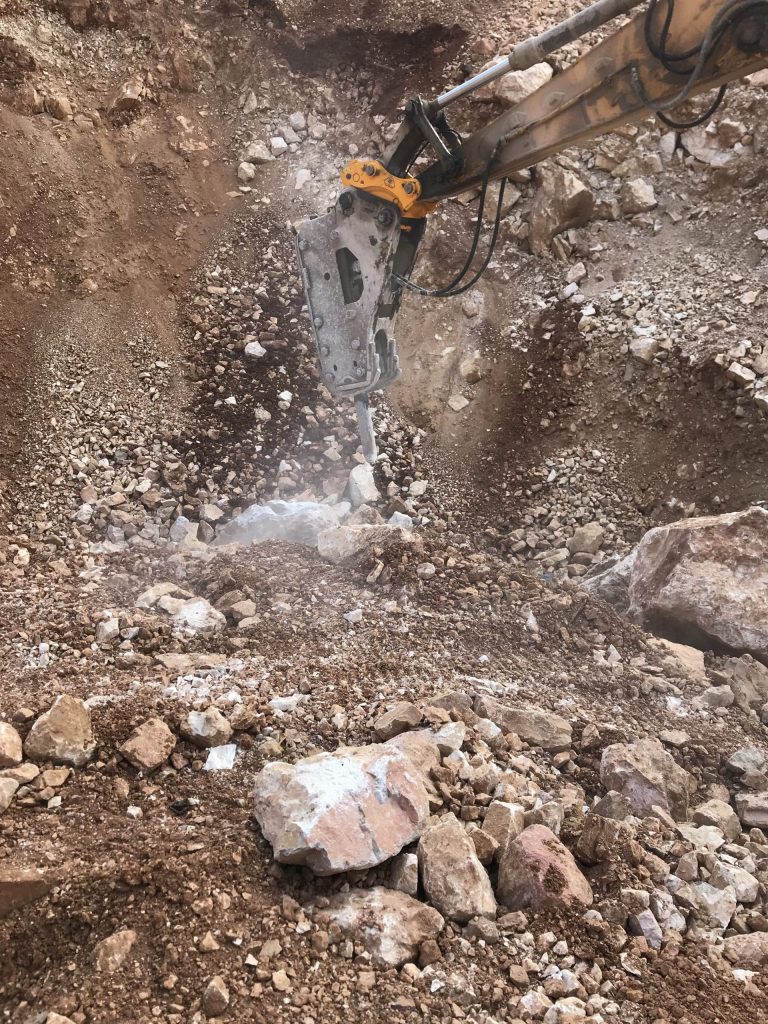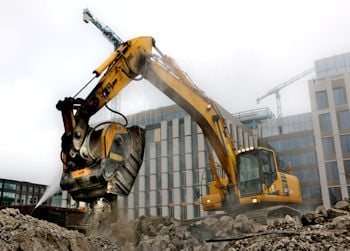Preparing Your Cat Construction Equipment for Winter
Heavy equipment needs care before cold temperatures and less-than-ideal conditions arrive. Whether you utilize your equipment regularly during the winter or only on occasion, it’s essential to understand each piece’s component, preparation and storage needs.
Cold temperatures and ice can impact your equipment’s operation, potentially damaging components and making it more challenging to use. You can save money on repairs, replacements or maintenance with the proper care for your fleet.
Winterizing your equipment requires inspections and maintenance. Machines you use often during the winter will require more thorough preparation before and after each use for seamless operation. Additionally, equipment that won’t see action in the cold requires proper long-term storage to prevent premature wear and tear.
Winterizing Elements to Consider
There are several basic elements to consider for your construction equipment. Fluids, electronics, batteries and undercarriages can quickly face adverse effects from winter weather, so addressing these components in each machine is essential.
- Fluids and filtration: Oil and other fluids are vital for proper equipment function. Cold weather can affect fluid viscosity, which increases the chances of wear or failure. While winterizing construction equipment, ensure you’re using the proper fluids for the winter and check or replace your air filters when necessary.
- Batteries and electronics: Although running batteries in cold weather doesn’t always affect their life span, other components can receive additional stress. During the winter, you may notice trouble maintaining power or starting equipment. Keeping batteries charged and monitoring for corrosion on connections or cables can significantly improve operations.
- Undercarriage: The undercarriage of many pieces of equipment receives significant wear and tear. The winter weather can place additional demands on frames, suspension systems and tires. Regular inspections allow you to identify potential problems before they cause significant setbacks, such as low tire pressure, signs of damage or loose parts.
Winterizing Your Construction Equipment
Regular winter use will require weekly and daily maintenance tasks to ensure your equipment can handle the job. Small amounts of care and preventative work can be the difference between seamless operation and vehicle damage.
1. Find Heavy Machinery Storage
Some of your equipment may need long-term storage when the temperatures drop. Begin preparation by lubricating your equipment with a high-viscosity lubricant. These lubricants will coat the equipment better than low-viscosity lubricants and are less likely to drip off in the cold.
Additionally, you must drain all liquid from the engine. You should also remove the battery and find a room-temperature location to store it to prevent it from losing charge.
Once you find a safe location to store your equipment, you must label it as not ready for use. Labeling will prevent other people from using the equipment before you’ve prepped it for the spring. Cover the equipment if you have a cover available to protect it from scrapes or dust that could accumulate throughout the season.
2. Use Block Heaters
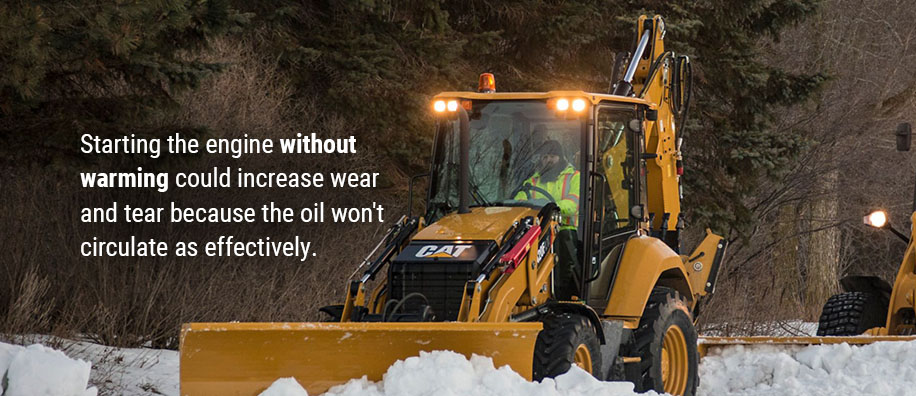
Block heaters can help when winterizing a diesel engine by warming the engine block and the coolant or oil in your equipment. This process allows you to start the machine smoothly in cold conditions. Cool temperatures can cause oil to thicken, which makes it more difficult for the engine to turn over. Starting the engine without warming could increase wear and tear because the oil won’t circulate as effectively.
To get the most out of the block heater, plug it in roughly three hours before you use the equipment.
3. Ensure Engine Operating Temperature
A warm engine operates more efficiently than a cold engine. You can prevent valves in your equipment from sticking by running the engine before using the equipment. Cycle through the machine’s function before beginning work for the day to distribute heat and ensure no issues could cause you to pause in the middle of a job.
Also, keep batteries warm and fully charged. Warm temperature allow batteries to aid easy starting and prolong their life span. When you’re not using the batteries, store them in a room-temperature location.
4. Monitor Tire Inflation
At the start of each shift, inspect your tires to ensure they have the proper pressure for operation. Cold air can cause tires to lose air much faster, and deflated tires can lead to poor efficiency and machine wear and tear.
Inflate tires in a warm location to help the bead seat better. You can eliminate ice crystals by using dry nitrogen gas to inflate the tires. Evaluate the necessary pressure for your tires by determining the temperature you’ll be operating in and the machine’s specific recommendations.
5. Conduct Visual Inspections
Daily or weekly visual inspections will empower you to identify any potential problems before operating the equipment. While inspecting your equipment, look for work spots, scratches and cracks.
You should evaluate the entire machine, but common areas to check include the tires, belts and hoses. During these inspections, be sure to remove any debris, snow or dirt that accumulates on the undercarriage or tires.
If you notice an issue with your equipment, label the piece as not ready for use and request a repair service.
6. Prepare Full Tanks
Fill the fuel tanks at the end of every shift. This process can help avoid a frozen tank, leading to operation failure or premature damage.
While preparing the tanks, be sure the tank is clean of debris, sediment and water, as these contaminants can affect machine function. Condensation can be a significant problem in the winter, leading to a buildup of water in the tank and freezing or corrosion as a result. A full tank minimizes space for other liquids, preventing water droplets from forming.
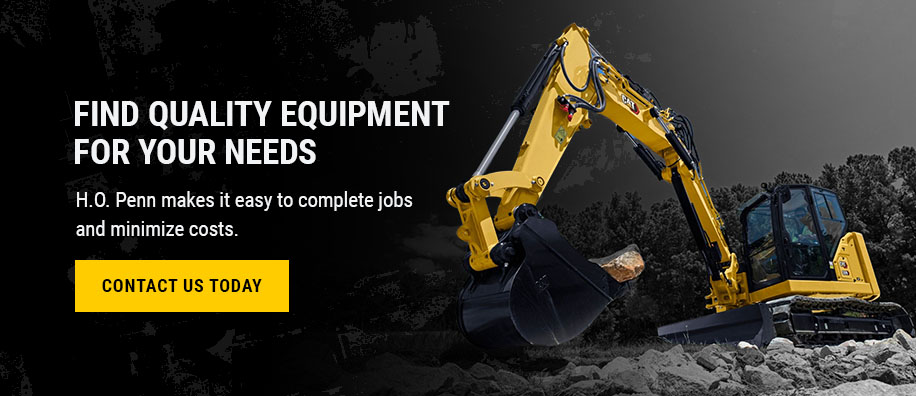
Find Quality Equipment for Your Needs
At H.O. Penn Machinery, you can access an extensive catalog of new and used equipment to complete the most challenging jobs. H.O. Penn Machinery offers exclusive rentals of pavers, wheel loaders, articulated trucks and other Cat® construction machinery.
H.O. Penn makes it easy to complete jobs and minimize costs. Connect with our team to discuss your unique equipment needs.
Contact Us Find a Location
